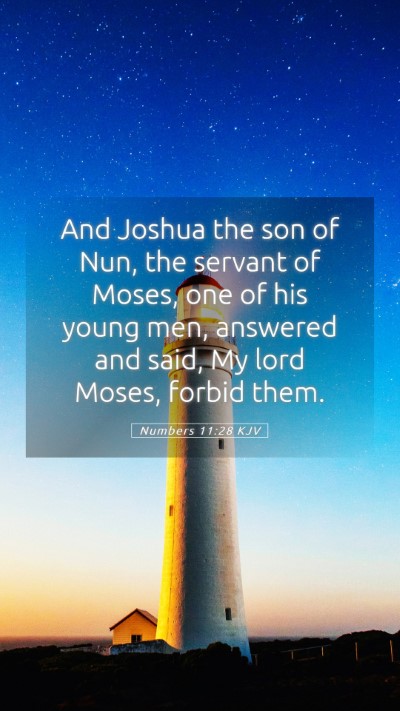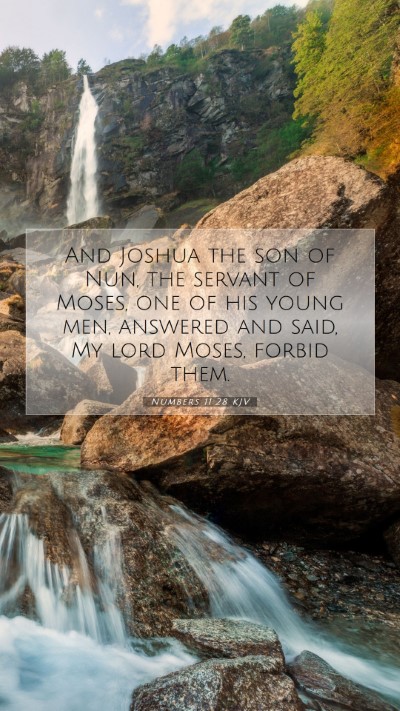Bible Verse Commentary on Numbers 11:28
Introduction
Numbers 11:28 states: "And Joshua the son of Nun, the servant of Moses, one of his young men, answered and said, My lord Moses, forbid them." This verse occurs in a narrative context where the spirit of prophecy is active among those who are not part of the formal leadership structure. The verse reflects concerns regarding authority and the proper channeling of God's spirit.
Verse Meaning and Analysis
This passage features a response from Joshua, who was deeply devoted to Moses as both his leader and mentor. He expresses concern about other individuals prophesying in the camp, fearing that it could lead to disorder or undermine Moses' authority. This sentiment reveals several layers of meaning worth exploring through biblical exegesis.
- Concern for Authority: Joshua's reaction highlights a common theme in Scripture about the importance of recognizing and adhering to God-given authority. The apprehension Joshua displays can be interpreted as a legitimate concern for maintaining the structure God established through Moses. According to Matthew Henry, this reflects the orderliness that should characterize God's people.
- Role of the Prophetic: The act of prophesying is significant in biblical theology. Adam Clarke notes that prophesying was traditionally reserved for leaders. Thus, the unauthorized activity of these individuals posed a potential threat to the divine order. Joshua, as a leader-in-training, is apprehensive about this breach of tradition.
- Misunderstanding of God’s Spirit: Albert Barnes suggests that Joshua’s response demonstrates a limited understanding of how God’s Spirit operates beyond human boundaries. God empowers whom He wills, and His choices may occasionally differ from human expectations.
Historical and Cultural Context
Understanding the historical backdrop of this verse is crucial. The Israelites were in the wilderness, journeying towards the Promised Land. They faced numerous challenges, including rebellion and dissent. This context amplifies Joshua's protective instincts, as he witnessed the turmoil among the people. Leadership during this time required both spiritual and practical wisdom, and Joshua was learning this from Moses.
Implications for Leadership
The fear Joshua had serves as a lesson for leaders in any context. They must balance openness to the movement of God's Spirit with the necessity of maintaining order and clarity in leadership. The essence of biblical leadership is to guide people while fostering an environment where God's work can flourish in ways that may sometimes be unexpected.
Application of the Verse to Daily Life
This verse invites individuals to reflect on how they engage with authority and God's presence. It challenges us to evaluate whether we support our leaders in ways that encourage divine work or if we question and undermine them out of insecurity or misunderstanding. In practical terms, believers are encouraged to participate actively in their spiritual communities and support the leadership while remaining open to God's active work.
Related Scripture Cross References
- Numbers 11:24-26: This passage describes how the Spirit rested on the seventy elders, showcasing the powerful presence of God acting outside traditional limitations.
- Exodus 18:13-27: This section depicts Moses appointing leaders, underlining the theme of delegation and proper leadership structure in spiritual communities.
- 1 Samuel 10:6: Here, Saul is given the Spirit of God, demonstrating that divine empowerment can transcend established hierarchies.
Conclusion
Numbers 11:28 serves as a poignant reminder of the complexities in communal and spiritual life. It illustrates the importance of recognizing God’s sovereignty in the midst of human concerns. Whether in the context of Scripture study groups, online Bible study, or personal reflection, exploring such verses helps deepen our understanding of God's ways and the biblical narrative as a whole.


